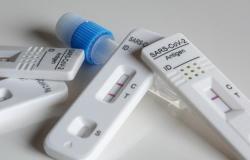
We are less afraid of being infected with AIDS, but we still feel the same unease when faced with an HIV-positive person. This is the result of an IFOP study commissioned by the AIDES association, which is celebrating its 40th anniversary. Forty years of supporting people infected with HIV and fighting against prejudice. Today, the danger is the trivialization of the disease. We talk much less about AIDS than in the 1980s or 1990s. We also die from it much less because medicine has made enormous progress, but we still can’t cure it. According to AIDES, there are 5,000 to 6,000 new cases of infection in France each year.
However, in this study 40% of respondents today consider that the risk of being contaminated by the AIDS virus is not significant.. (Compared to 14% in 1988). “Last year, on the window of our premises on Place Émile-Zola in Dijon, we could even read ‘Two Doliprane and it’s over’. Someone came to tag this sentence in the middle of the night” Emmanuel Bodoignet emphasizes, one of the 50 volunteers in Côte-d’Or of this association. “This shows the level of ignorance currently. We must therefore continue to reach out to the public, continue our awareness-raising actions. We therefore have our premises on Place Émile-Zola, we also go to the beach at Lake Kir which is a meeting place, to the saunas, but also to the shelters for asylum seekers in Côte-d’Or and Saône-et-Loire. I still have a lot of hope, even if these figures worry us.”
Mistrust of HIV-positive people has not disappeared
Paradoxically, although we are less afraid of getting sick, we remain wary of HIV-positive people. 16% of those surveyed said they were still uncomfortable with the idea of being in contact with someone carrying HIV. 21% of French people would be uncomfortable knowing that their child’s teacher is HIV positive and less than half would continue to date someone they had sex with if they found out they were HIV-positive. This trend only strengthens the determination of Emmanuel Bodoignet, who does not hide the fact that he is HIV-positive.
“I chose to say it, and I wear the red ribbon that symbolises the fight against AIDS on my jacket every day. It’s a way of saying ‘you can come and talk to me about this subject’, and I encourage everyone to talk about it at their workplace, in their circle of friends, at university. All this means that even though our association is 40 years old, we still have work to do to raise awareness… Well, we’re going to continue!” he says with a big smile.





